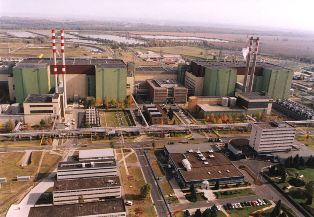The Hungarian parliament has given overwhelming preliminary support to a government proposal to begin the detailed preparation for the construction of new nuclear generating capacity at the Paks plant.
 |
| Hungary's Paks plant (Image: Paks NPP) |
In a 30 March vote, the proposal was approved by 330 votes and opposed by six, while there were ten abstentions. The proposal was submitted by the minister for transport, energy and communications, Csaba Molna.
Under Hungary's nuclear energy act, the government must obtain parliament's preliminary conceptual approval before taking specific steps leading to the construction of new nuclear capacity.
The proposal had been approved earlier in the day by parliament's environmental committee in a vote with 15 in support, one against and one abstention.
A senior energy ministry official, Tamas Zarandy, told the committee that the increase in the capacity of the Paks nuclear plant was necessary in order to secure the electricity supply and price predictability, the MTI news agency reported. He said that the expansion is also justified on environmental and employment grounds.
The parliament's economic committee also unanimously voted in support of the proposal earlier in March.
The Paks plant currently comprises four Russian-supplied VVER-440 pressurized water reactors, which started up between 1982 and 1987. Though originally 440 MWe gross, the units have been upgraded and will be modified further to give 500-510 MWe gross. In 2004, the parliament economic committee decided upon a 20-year life extension project for the four Paks units. The plant currently generates almost 40% of Hungary's electricity.
The construction of new reactors at the Paks site has been proposed in order to meet future electricity demand. In early 2009, the prime minister urged parliament to approve this, though foreign investment would be needed.






_15863.jpg)







